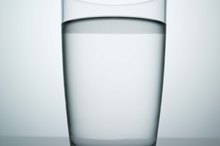What does fact checked mean?
At Healthfully, we strive to deliver objective content that is accurate and up-to-date. Our team periodically reviews articles in order to ensure content quality. The sources cited below consist of evidence from peer-reviewed journals, prominent medical organizations, academic associations, and government data.
- MayoClinic.com: Hair Loss: Causes
- PubMed: Fluorine-Induced Apoptosis And Lipid Peroxidation In Human Hair Follicles In Vitro
- PubMed: Fluorine-Induced Apoptosis And Lipid Peroxidation In Human Hair Follicles In Vitro
The information contained on this site is for informational purposes only, and should not be used as a substitute for the advice of a professional health care provider. Please check with the appropriate physician regarding health questions and concerns. Although we strive to deliver accurate and up-to-date information, no guarantee to that effect is made.
Fluoride & Hair Loss
Many people see their thinning hair as a sign of aging, but the truth is hair loss comes from many sources. Environmental factors and chemicals may also have a role in hair loss. Fluoride is an ion of fluorine, a chemical element of the halogen group. Many communities introduce fluoride into the water systems as a way to help prevent cavities and increase oral health. Too much fluoride, or fluoride poisoning, may be one reason a person suffers from hair loss, though definitive medical studies are lacking in this area.
Hair Loss
Hair loss often comes in stages. It may begin as a few strands that go down the drain when you wash your hair or as loose hairs that stick to a comb. According to MayoClinic.com, it is normal to lose some hair on a daily basis 3. In fact, most individuals will shed up to 100 hairs a day.
Long-term hair loss occurs when there is disruption in the growth cycle. This disruption may be because of genetics, medications, illnesses or possibly environmental factors.
- Hair loss often comes in stages.
- It may begin as a few strands that go down the drain when you wash your hair or as loose hairs that stick to a comb.
Fluoride
Fluoride & Headaches
Learn More
Fluoride is a naturally occurring element found in food, water and soil. It is also an essential trace element for the body. Communities add supplemental fluoride to water supplies to help prevent tooth decay.The continued use of fluoride supplementation in drinking water is somewhat controversial. There have been some questions about its safety and effectiveness. One issue might be the concern over fluoride poisoning, although this is rare. One 2010 study by Zheng-hui Wang and colleagues from the Second Hospital in China shows there may be a correlation between hair follicle damage and fluoride. The exact way the excess fluoride effects the hair follicle is unclear, but damage will result in hair loss. **According to Medical News Today, some scientists and interest groups have shown concern about the continued application of fluoride to the water systems, deeming the application unnecessary and less useful than previously thought 1.
- Fluoride is a naturally occurring element found in food, water and soil.
- According to Medical News Today, some scientists and interest groups have shown concern about the continued application of fluoride to the water systems, deeming the application unnecessary and less useful than previously thought 1.
Fluoride Poisoning
A case study article for the University of Western Ontario website discusses fluorosis, a condition where fluoride levels become toxic. There is concern that fluoride supplements introduced into groundwater have become part of other ecosystems. For instance, grass absorbs fluoride from groundwater and cows ingest the grass. This may introduce additional fluoride into beef products.
Proponents of this theory associate some illnesses with excess fluoride 2. Included on this list are asthma, learning disorders, autism, breast cancer and eczema. Medical science has not proven or disproven this theory. Fluoride poisoning is not common and does not occur to everyone.
- A case study article for the University of Western Ontario website discusses fluorosis, a condition where fluoride levels become toxic.
Theories/Speculation
Is Gray Hair a Symptom of a Magnesium Deficiency?
Learn More
The overexposure of humans and animals to the element fluoride is unproven. An increase in diagnoses of some conditions, such as autism, might be attributed to advancement in science. The benefits of fluoride are proven, however, and there is little doubt that fluoride improves dental health and reduces incidence of tooth loss because of cavities.
More studies are needed before the medical community can state that exposure to fluoride is a fundamental cause of hair loss 1. Although the 2010 study from Zheng-hui Wang, published in "Biological Trace Element Research," does show a possible connection to follicle damage that results in hair loss, more studies will be necessary to prove the theory. Pattern baldness is a hereditary trait that travels through generations of families and may have nothing to do with fluoride use.
- The overexposure of humans and animals to the element fluoride is unproven.
- Although the 2010 study from Zheng-hui Wang, published in "Biological Trace Element Research," does show a possible connection to follicle damage that results in hair loss, more studies will be necessary to prove the theory.
Considerations
Oral health is important part of having teeth that last a lifetime. Fluoride is an effective component in combating problems that lead to tooth loss. One symptom that you may have too much fluoride, or be suffering from fluorosis, is discoloring of enamel on teeth.
If you notice your teeth developing a brownish tint, talk to your dentist about the use of fluoride. Excessive fluoride may also lead to a weakening of the bones and joint stiffness. **Other symptoms include nausea, diarrhea, excessive salivation, watery eyes and a general feeling of fatigue.
** Do not assume if you are feeling ill or begin to lose your hair, that you have been exposed to high levels of fluoride. See your doctor for proper diagnosis.
- Oral health is important part of having teeth that last a lifetime.
- One symptom that you may have too much fluoride, or be suffering from fluorosis, is discoloring of enamel on teeth.
Related Articles
References
- Medical News Today: What Is Fluoride? What Does Fluoride Do?
- PFPC: The Fluoride Education Project: Symptoms/Associations
- MayoClinic.com: Hair Loss: Causes
- PubMed: Fluorine-Induced Apoptosis And Lipid Peroxidation In Human Hair Follicles In Vitro
- Medical News Today: End Fluoridation, Say 500 Physicians, Dentists, Scientists And Environmentalists
- Aoun A, Darwiche F, Al Hayek S, Doumit J. The Fluoride Debate: The Pros and Cons of Fluoridation. Prev Nutr Food Sci. 2018 Sep;23(3):171-180. doi: 10.3746/pnf.2018.23.3.171. Epub 2018 Sep 30.
- Cheng X, Liu J, Li J, Zhou X, Wang L, Liu J, Xu X. Comparative effect of a stannous fluoride toothpaste and a sodium fluoride toothpaste on a multispecies biofilm. Arch Oral Biol. 2017 Feb;74:5-11. doi: 10.1016/j.archoralbio.2016.10.030. Epub 2016 Oct 29.
- Lv YG, Kang L, Wu G. Fluorosis increases the risk of postmenopausal osteoporosis by stimulating interferon γ. Biochem Biophys Res Commun. 2016 Oct 14;479(2):372-379. doi: 10.1016/j.bbrc.2016.09.083. Epub 2016 Sep 17.
- Peckham S, Lowery D, Spencer S. Are fluoride levels in drinking water associated with hypothyroidism prevalence in England? A large observational study of GP practice data and fluoride levels in drinking water. J Epidemiol Community Health. 2015 Jul;69(7):619-24. doi: 10.1136/jech-2014-204971. Epub 2015 Feb 24.
- Pornprasert S, Wanachantararak P, Kantawong F et al. Excessive fluoride consumption increases haematological alteration in subjects with iron deficiency, thalassaemia, and glucose-6-phosphate dehydrogenase (G-6-PD) deficiency. Environ Geochem Health. 2017 Aug;39(4):751-758. doi: 10.1007/s10653-016-9845-x. Epub 2016 Jun 18.
Writer Bio
Writing since 1999, Darla Ferrara is an award-winning author who specializes in health, diet, fitness and computer technology. She has been published in "Mezzo Magazine" and Diet Spotlight, as well as various online magazines. Ferrara studied biology and emergency medical technology at the University of Nebraska and Southeast Community College.









